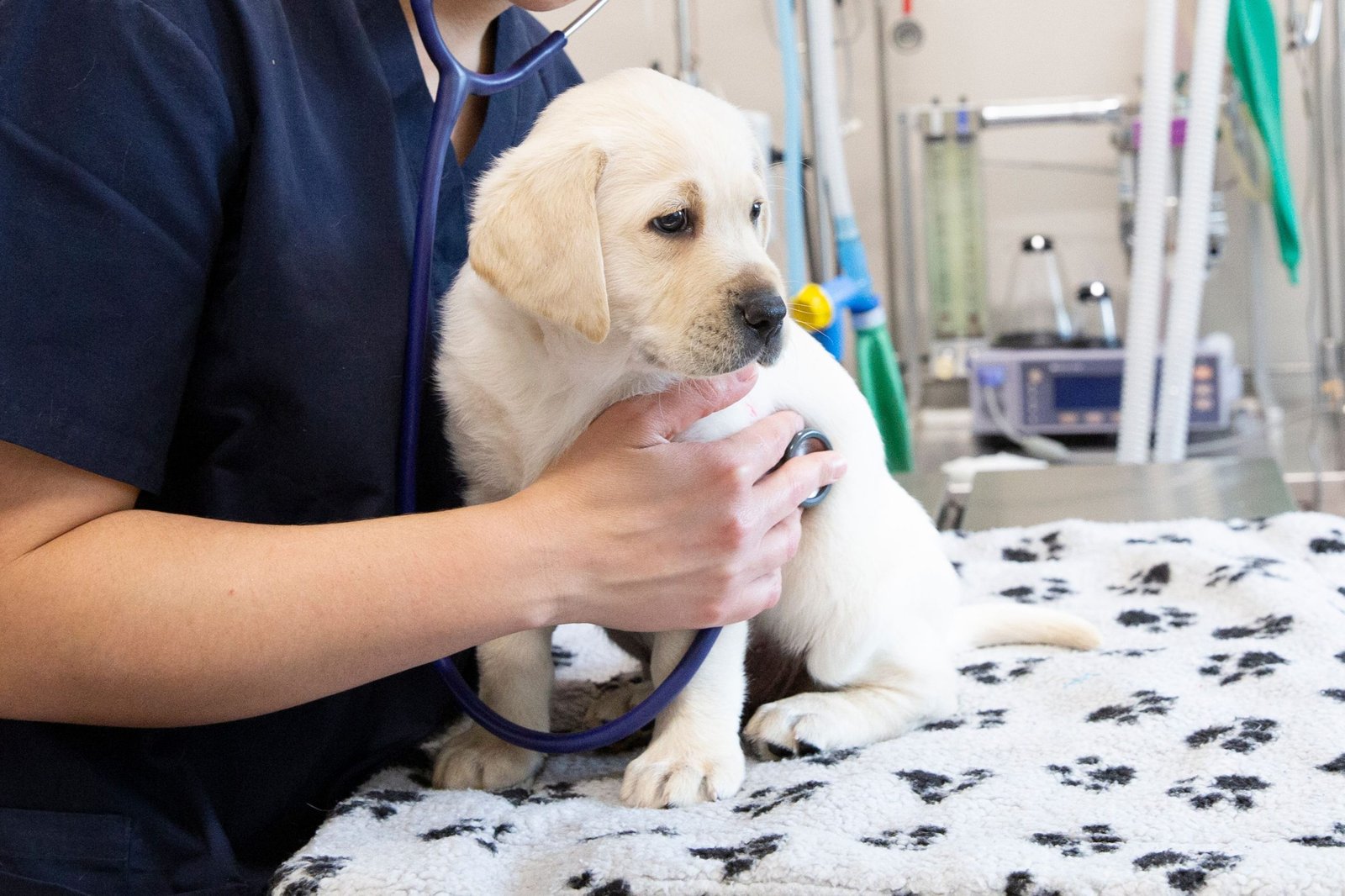To take care of a puppy, stock up on essential supplies, prepare your home, provide a safe space, visit the vet, give them a healthy diet and exercise, start socialization early, and never mistreat or confine them for long periods of time. Introducing a new puppy into your life is an exciting and rewarding experience.
However, it also comes with great responsibility. Taking care of a puppy requires careful planning and preparation to ensure they grow into healthy, well-behaved dogs. Stocking up on essential puppy supplies, such as food, toys, and grooming tools, is crucial.
Additionally, preparing your home by puppy-proofing it and creating a safe space for them is important to keep them out of harm’s way. Regular visits to the veterinarian for vaccinations and check-ups are essential for their overall health. Providing a balanced diet and regular exercise will help them develop properly. Early socialization is also crucial for their mental and emotional well-being. Lastly, it is important to never mistreat or confine your puppy for extended periods of time, as this can lead to behavioral issues.
:strip_icc()/how-to-care-for-puppies-1117475-hero-05219e04ec7a4a77a7f246bb5b6c40d4.jpg)
Credit: www.thesprucepets.com
Preparing For Your Puppy
Are you excited about bringing a new furry friend into your home? Preparing for your puppy ahead of time can make the transition smoother and ensure a happy and healthy start for your new family member. Here are some essential steps to take before your puppy arrives:
Stocking Up On Essential Puppy Supplies
It’s important to have all the necessary supplies on hand to meet your puppy’s needs. Here’s a checklist of essential puppy supplies:
- Leash
- Collar
- Dog toys
- Dog ID Tag
- Puppy Starter Kit
- Puppy Milk Replacer Plus
- Step‑in Air Dog Harness
- Puppy Potty Trainer
- Wellness Grain‑Free Puppy Bites
By ensuring you have these supplies ready, you’ll be well-prepared to cater to your puppy’s needs from day one.
Preparing Your Home For The Puppy
Creating a safe and welcoming environment for your puppy is essential. A few steps you can take to prepare your home include:
- Puppy-proofing your living space – make sure there are no hazards or toxic substances accessible to your puppy.
- Providing a designated area for your puppy to eat, sleep, and play.
- Setting up a crate or puppy pen for sleeping and resting.
By preparing your home in advance, you’ll be able to provide a secure and comfortable space for your puppy to thrive.
Welcoming Your Puppy With Love
Finally, when your puppy arrives, the most important thing you can do is to give them a warm and loving welcome. Shower them with affection, introduce them to their new surroundings gradually, and start establishing a positive bond from day one.
Remember, each puppy is unique, so take the time to understand their individual needs and cater to them accordingly. By providing a safe and loving environment, you’ll set the foundation for a happy and well-adjusted puppy.
Creating A Safe Environment
When bringing a new puppy into your home, one of the first things you need to prioritize is creating a safe environment for them. This involves taking measures to prevent accidents or incidents that could harm your furry friend. Here are some essential aspects to consider when it comes to the safety of your puppy:
Providing A Safe Space For Your Puppy
A safe space is crucial for your puppy’s well-being, ensuring they have a designated area where they can relax and feel secure. Consider setting up a crate or a puppy pen in a quiet corner of your home. This space will serve as their retreat during alone time or when visitors come over. Ensure that the area is free from hazards such as electrical cords, toxic plants, or small objects that your puppy could swallow.
Pet Insurance And Vet Visits
Investing in pet insurance is a smart decision to make early on. Accidents and unexpected health issues can happen at any time, and having comprehensive coverage will provide you with peace of mind. Regular vet visits are also essential to monitor your puppy’s health, get vaccinations, and address any concerns or questions you may have about their well-being.
Vaccinations, Microchipping, And Spaying/neutering
Vaccinations play a crucial role in protecting your puppy from various diseases. Consult with your veterinarian about the necessary vaccinations and their recommended schedule. Microchipping your puppy is another important step in ensuring their safety. In case they ever get lost, a microchip can greatly increase the chances of them being reunited with you. Lastly, consider the benefits of spaying or neutering your puppy, as it not only helps prevent unwanted litters but can also lead to a healthier and well-behaved adult dog.
Healthy Diet And Exercise
Feeding your puppy a balanced and nutritious diet is key to their overall well-being. Consult with your vet to determine the best food options for your puppy’s specific needs and age. Additionally, regular exercise is essential for keeping your puppy physically and mentally stimulated. Take them for walks, play games, and provide them with appropriate toys and activities to keep them active and engaged.
Starting Puppy Socialization Early
Puppy socialization is crucial for their development and helps them become well-adjusted and friendly adult dogs. Introduce your puppy to new experiences, people, and other animals gradually. This will help them build positive associations and prevent fear or aggression issues later on. Enroll them in puppy classes or organize playdates with other friendly dogs to facilitate socialization.
Taking Care Of Your Puppy
Taking care of a puppy requires stocking up on essential supplies, preparing your home, providing a safe space, going to the vet, giving them a healthy diet and exercise, and starting socialization early. It is important to avoid mistreating your puppy and not leaving them alone for long periods of time.
How Long Can A Puppy Be Left Alone?
Young puppies under six months should not be left alone for more than two hours. It is important to gradually increase the time they spend alone to prevent separation anxiety. Crate training or leaving them in a puppy-proofed room is a good idea when you are away.
What Not To Do When Taking Care Of A Puppy?
- Do not mistreat your puppy by shouting, hitting, or jerking on the leash.
- Do not call your puppy to reprimand it. This can create a negative association.
- Do not allow your puppy to chase objects like cars, bikes, or skateboards.
- Do not allow your puppy to chase other dogs, cats, or animals. It can lead to dangerous situations.
- Do not confine your puppy for long periods of time during the day. Puppies need to move and explore.
How Long Can A Puppy Be Left Alone?
Young puppies under six months should not be left alone for more than two hours. It is important to gradually increase the time they spend alone to prevent separation anxiety. Crate training or leaving them in a puppy-proofed room is a good idea when you are away.
What Not To Do When Taking Care Of A Puppy?
When taking care of a puppy, it is crucial to avoid certain actions that can have a negative impact on their well-being. Here are some things you should not do:
- Mistreat your puppy by shouting, hitting, or jerking on the leash. Positive reinforcement is key in training.
- Call your puppy to you to reprimand it. This can create a negative association with coming when called.
- Allow your puppy to chase objects like cars, bikes, or skateboards. It can be dangerous and lead to accidents.
- Allow your puppy to chase other dogs, cats, or animals. It can create tension and potentially harmful situations.
- Confine your puppy for long periods of time during the day. Puppies need exercise and mental stimulation.

Credit: www.youtube.com
Puppy Health And Well-being
Ensuring the health and well-being of your puppy is essential. Stock up on puppy supplies, create a safe space, provide a healthy diet, and start socialization early. Remember, mistreatment and leaving them alone for long periods are not recommended.
Toilet Training Your Puppy
Toilet training your puppy is one of the first and most important steps in ensuring their health and well-being. Start by designating a specific area in your home where your puppy can relieve themselves. Use positive reinforcement techniques such as treats and praise to reward your puppy for using the designated spot. Be consistent with a regular feeding schedule to establish a predictable bathroom routine. Supervise your puppy closely and take them outside frequently, especially after meals, naps, or playtime. Remember to be patient and consistent, as accidents are a natural part of the process.Puppy Nutrition
Proper puppy nutrition is crucial for their overall health and development. Choose a high-quality puppy food that is specifically formulated to meet their unique nutritional needs. Look for a balance of protein, fat, carbohydrates, vitamins, and minerals. Follow the feeding guidelines provided on the food packaging and adjust as needed based on your puppy’s age, size, and activity level. Make sure to provide fresh water at all times and avoid feeding your puppy excessive treats or human food, as it may lead to nutritional imbalances or weight issues.Puppy Grooming
Regular grooming is essential for maintaining your puppy’s health and keeping them looking their best. Start by introducing your puppy to grooming gradually to make it a positive experience. Brush your puppy’s coat regularly to remove loose hair and prevent matting. Trim their nails regularly to avoid discomfort or injury. Clean their ears gently with a damp cloth to prevent infections. Finally, establish a dental care routine by brushing your puppy’s teeth regularly or providing appropriate dental chews. Remember to use grooming products that are safe for puppies and consult a professional groomer if needed.In conclusion, prioritizing your puppy’s health and well-being is the key to raising a happy and thriving companion. By investing time and effort into proper toilet training, nutrition, and grooming, you can ensure that your puppy grows up to be a healthy and well-rounded adult dog. Remember to consult with your veterinarian for personalized advice and guidance throughout your puppy’s journey.
Faqs And Additional Resources
Discover valuable answers to your puppy care questions and find additional resources to ensure you give your new furry friend the best care possible. From puppy supplies and sleeping arrangements to training tips and health guidelines, find everything you need to know about taking care of a puppy.
Common Questions About Puppy Care
Here are some common questions that new puppy owners often have:
- Where should a puppy sleep first night?
The very best place for your puppy to sleep is in a crate or a puppy pen next to your bed. You can choose if you want to have them next to you in the bedroom, or if you want to set up a temporary bed next to wherever you would prefer them to sleep.
- How long can a puppy be left alone for?
Young puppies under six months shouldn’t really be left alone for more than two hours. And it’s a good idea to build up the time they spend alone gradually to prevent separation anxiety from setting in. When you do leave your puppy alone, it’s a good idea to crate train them, or leave them in a puppy-proofed room.
- What not to do when taking care of a puppy?
DO NOT:
- Mistreat your puppy by shouting, hitting, or jerking on your puppy’s leash.
- Call your puppy to you to reprimand it.
- Allow your puppy to chase objects like cars, bikes, or skateboards.
- Allow your puppy to chase other dogs, cats, or other animals.
- Confining your puppy for long periods of time during the day.
Dog Insurance For Puppies
Having dog insurance for your puppy is an important step in taking care of their health and well-being. Here are some common questions about dog insurance for puppies:
- How do you take care of a puppy?
Stock up on essential puppy supplies. Prepare your home for the puppy. Welcome your puppy with love. Give your puppy a safe space. Get pet insurance and go to the vet. Vaccinate, microchip, and spay or neuter. Provide a healthy diet and exercise. Start puppy socialization ASAP.
Puppy Health Care Faqs
Here are some frequently asked questions about puppy health care:
- What should you do if your puppy gets sick?
If your puppy gets sick, it is important to seek veterinary care right away. Don’t wait for their symptoms to worsen or hope for them to get better on their own. Early detection and treatment are crucial for their well-being.
- When should you start vaccinating your puppy?
The vaccination schedule for puppies typically starts at around 6-8 weeks of age. Consult with your vet to determine the appropriate vaccination plan for your puppy.

Credit: www.youtube.com
Frequently Asked Questions On Taking Care Of A Puppy
Where Should A Puppy Sleep First Night?
The best place for a puppy to sleep on their first night is in a crate or puppy pen next to your bed. You can choose to have them in your bedroom or set up a temporary bed in a preferred location.
Ensure they have a safe space to sleep.
How Do You Take Care Of A Puppy?
To take care of a puppy, stock up on essential supplies, prepare your home, and welcome them with love. Provide a safe space, get pet insurance, and take them to the vet for vaccinations, microchipping, and spaying/neutering. Offer a healthy diet, exercise, and start socializing them early.
Avoid mistreating them, allowing them to chase dangerous objects or animals, and confining them for long periods. Gradually build up the time they spend alone to prevent separation anxiety.
How Long Can A Puppy Be Left Alone For?
A puppy should not be left alone for more than two hours, especially if they are under six months old. Gradually increase the time they spend alone to prevent separation anxiety. Consider crate training or puppy-proofing a room when leaving them alone.
What Not To Do When Taking Care Of A Puppy?
To properly care for a puppy, avoid mistreating or punishing them. Don’t let them chase cars or other animals, and don’t confine them for long periods. Make sure to provide toys, exercise, and mental stimulation. Gradually introduce exercise and puppy-proof your home to avoid accidents.
Conclusion
Taking care of a puppy is a commitment that requires love, patience, and responsibility. It is essential to stock up on essential puppy supplies and prepare your home to provide a safe and welcoming environment for your furry friend. Regular visits to the vet, vaccinations, and a healthy diet are crucial for their well-being.
Socializing your puppy at an early age and providing them with plenty of love and exercise will help them grow into happy and well-adjusted dogs. Remember, they are counting on you for their care and happiness, so make sure to give them the VIP treatment they deserve.







